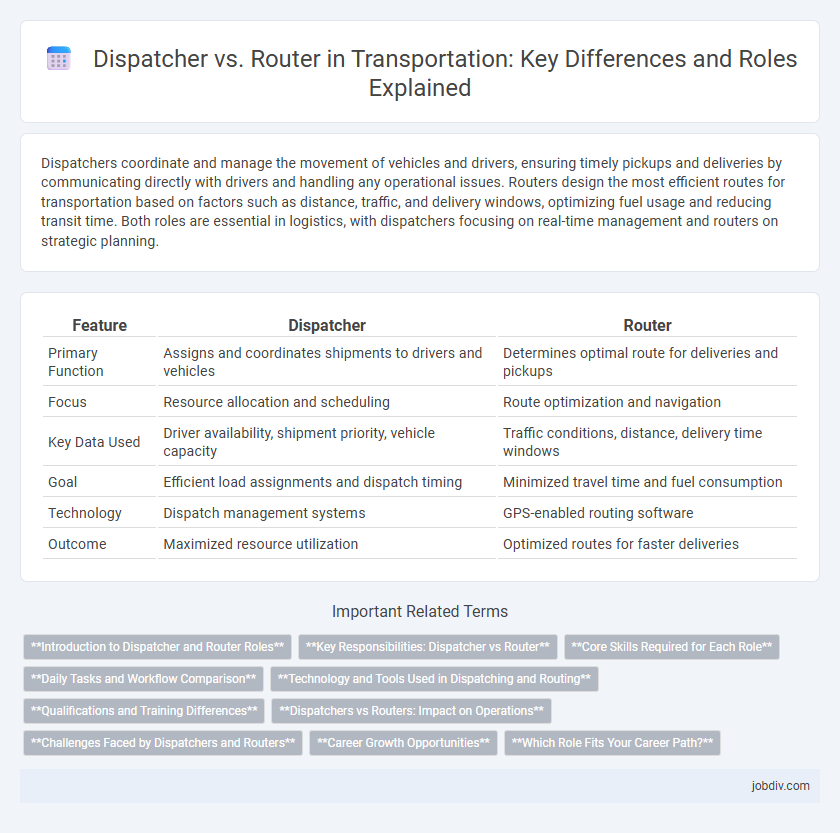Dispatchers coordinate and manage the movement of vehicles and drivers, ensuring timely pickups and deliveries by communicating directly with drivers and handling any operational issues. Routers design the most efficient routes for transportation based on factors such as distance, traffic, and delivery windows, optimizing fuel usage and reducing transit time. Both roles are essential in logistics, with dispatchers focusing on real-time management and routers on strategic planning.
Table of Comparison
| Feature | Dispatcher | Router |
|---|---|---|
| Primary Function | Assigns and coordinates shipments to drivers and vehicles | Determines optimal route for deliveries and pickups |
| Focus | Resource allocation and scheduling | Route optimization and navigation |
| Key Data Used | Driver availability, shipment priority, vehicle capacity | Traffic conditions, distance, delivery time windows |
| Goal | Efficient load assignments and dispatch timing | Minimized travel time and fuel consumption |
| Technology | Dispatch management systems | GPS-enabled routing software |
| Outcome | Maximized resource utilization | Optimized routes for faster deliveries |
Introduction to Dispatcher and Router Roles
Dispatchers coordinate vehicle assignments and monitor fleet operations to ensure timely deliveries and efficient resource allocation. Routers design optimal routes using traffic data, distance metrics, and delivery priorities to minimize transit time and fuel consumption. Both roles are essential in streamlining transportation logistics and improving overall operational efficiency.
Key Responsibilities: Dispatcher vs Router
Dispatchers manage real-time logistics by coordinating vehicle assignments and monitoring schedules to ensure timely deliveries within transportation networks. Routers design optimal routes by analyzing factors like distance, traffic, and cost-efficiency to enhance overall fleet performance and reduce operational expenses. Both roles are critical in streamlining supply chain processes, with dispatchers focusing on execution and routers concentrating on strategic route planning.
Core Skills Required for Each Role
Dispatchers require exceptional communication skills, real-time decision-making abilities, and strong organizational capabilities to efficiently manage schedules and coordinate vehicle movements. Routers need advanced analytical skills, proficiency with routing software, and a deep understanding of logistics to optimize delivery routes and reduce operational costs. Both roles demand attention to detail and adaptability to dynamic transportation conditions to ensure seamless supply chain execution.
Daily Tasks and Workflow Comparison
Dispatchers coordinate vehicle assignments, monitor real-time locations, and handle driver communications to ensure timely deliveries and resolve issues. Routers focus on planning optimal routes using GPS and traffic data, balancing load efficiency and fuel costs while adjusting routes based on changing conditions. Both roles require collaboration to streamline transportation workflows, improve delivery accuracy, and enhance overall operational efficiency.
Technology and Tools Used in Dispatching and Routing
Dispatchers utilize advanced communication systems, GPS tracking, and real-time data analytics platforms to coordinate vehicle movements and manage schedules effectively. Routers rely on sophisticated route optimization software, geospatial algorithms, and automated mapping tools to determine the most efficient paths for deliveries and transit. Integration of AI-driven platforms and Internet of Things (IoT) devices enhances accuracy and responsiveness in both dispatching and routing processes.
Qualifications and Training Differences
Dispatchers typically require strong communication skills and familiarity with logistics software, with training often provided on the job or through vocational courses. Routers demand advanced knowledge in route optimization algorithms, geographic information systems (GIS), and supply chain management, usually backed by formal education in transportation or logistics. Certification programs such as Certified Transportation Professional (CTP) benefit both roles but are especially critical for routers managing complex routing strategies.
Dispatchers vs Routers: Impact on Operations
Dispatchers coordinate real-time vehicle assignments and manage delivery schedules, ensuring timely responses and efficient resource allocation, which directly enhances operational fluidity. Routers optimize route planning by calculating the most efficient paths based on distance, traffic patterns, and delivery constraints, reducing fuel consumption and transit times. The combined impact of dispatchers and routers significantly improves logistics efficiency, operational costs, and customer satisfaction in transportation management.
Challenges Faced by Dispatchers and Routers
Dispatchers face challenges such as managing real-time traffic disruptions and coordinating multiple transportation modes to ensure timely deliveries. Routers encounter difficulties optimizing route efficiency while balancing fuel costs, delivery windows, and dynamic customer demands. Both roles require advanced decision-making tools to address unpredictable variables and maintain operational effectiveness.
Career Growth Opportunities
Dispatcher roles in transportation often provide foundational experience in logistics coordination, paving the way for advancement into management or operational roles. Routers typically engage in complex route planning and network optimization, offering career growth through specialization in supply chain strategy and technology integration. Both paths can lead to senior positions such as logistics manager, operations director, or supply chain analyst, depending on skills acquired and industry demand.
Which Role Fits Your Career Path?
Dispatchers coordinate real-time logistics by managing vehicle routes and schedules, ensuring timely deliveries and efficient resource allocation in transportation networks. Routers design optimal routing plans using algorithms and data analysis to minimize travel time and costs across supply chains. Choosing between dispatcher and router depends on your preference for hands-on operational management versus strategic planning and analytical problem-solving in transportation careers.
Dispatcher vs Router Infographic

 jobdiv.com
jobdiv.com